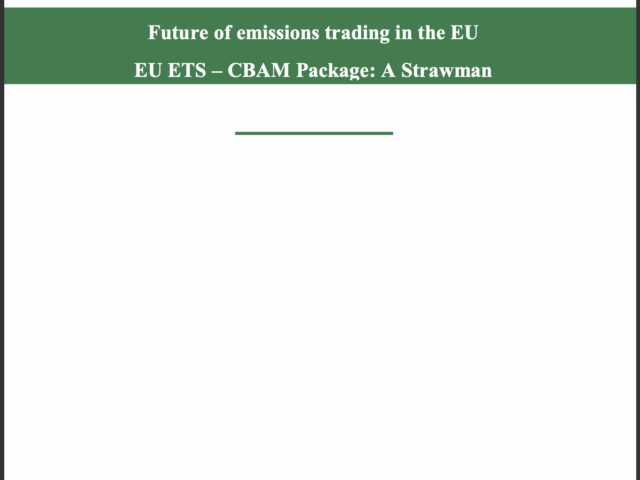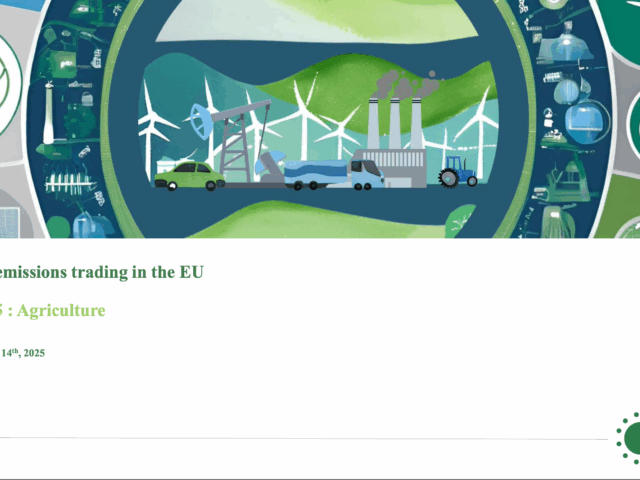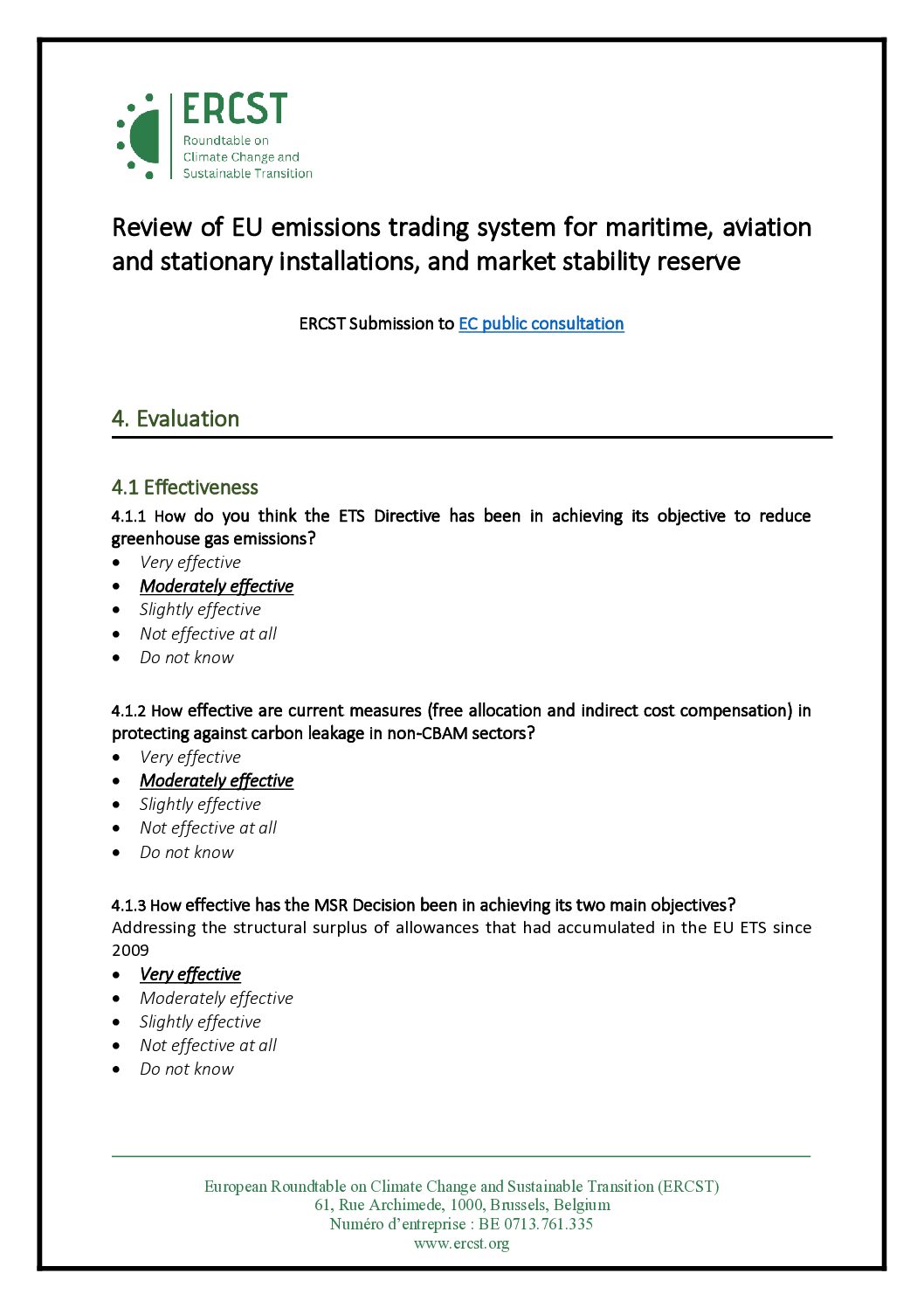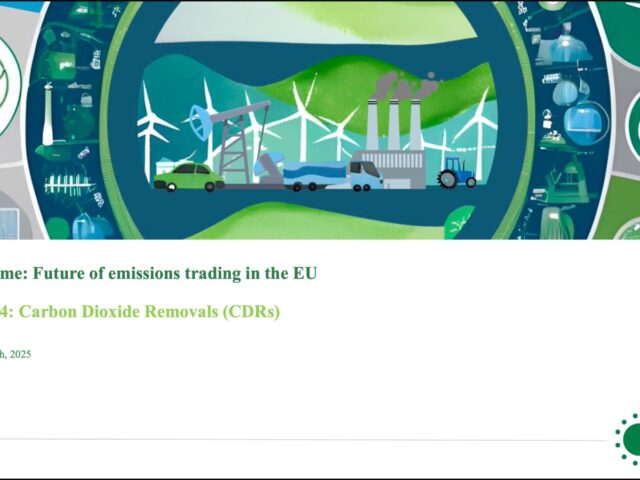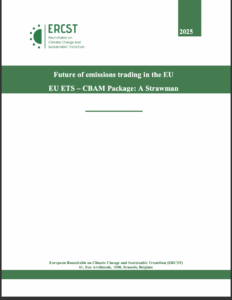The European Emission Trading System (ETS) has emerged as the backbone of the EU Climate Action and, especially in the last two years, as a crucial driver of decarbonization. The cap-and-trade system puts a price on carbon while ensuring GHG emissions decline through its cap. Market participants can trade emission allowances to compensate for the CO2 they emit. The EU ETS aims to facilitate cost-efficient decarbonization.
The EU ETS is the first and most developed carbon market across the world and covers more than 40% of all EU emissions. Over its first three phases, between 2005 and 2020, many reforms have been implemented to increase its effectiveness and market functioning. Since 2018, reforms for phase IV have been implemented and the ETS revision is also a large component of the Fit For 55 package, proposed by the Commission in July 2021. A revised EU ETS Directive was adopted in 2023, for the period running until 2030.
Since ERCST’s inception, the EU ETS policy file has been central to ERCST’s efforts to facilitate cooperation between policymakers and other stakeholders in articulating cost-effective climate policy. Throughout the years, ERCST has organised numerous roundtables, circulated a wide range of publications and in the process, took a place among global thought leaders on the subject.
ERCST’s work on the EU ETS can be subdivided into three different strands:
- State of the EU ETS
- Future of the EU ETS
The EU ETS has always been presented as an important component of the EU climate change policy. How well it delivers is critical for the overall delivery by the EU on its climate change commitments.
Each year, ERCST together with its partners, publishes the State of the EU ETS report. This report is intended as a “snapshot”, providing policymakers and stakeholders with an overview of how the EU ETS is doing by April of each year, based on previous year data. Within the constraints posed by the lack of publicly accessible data, the Report tries to assess the question whether the EU ETS is “fit for purpose”.
In 2024, the 9th annual report will be produced together with the Wegener Centre on Climate and Global Change, BloombergNEF and Compass Lexecon. In addition to the report, the project aims to bring together small groups of stakeholders deeply involved in EU ETS discussions, through meetings held in Brussels and in other EU Member States.
The EU ETS is seen as one the important drivers since it came into operation in 2005. However, as we reach end of 2020’s and forward middle of 2030, there are many issues that need to be discussed – fundamentally if the EU ETS is the right instrument as we reach towards zero allowances and what architecture and governance it should take.
The Future of the Emissions Trading System in the EU is a process that ERCST is putting into place as an independent review to have the EU institutions and EU stakeholders in this important debate. In the framework of this sub-workstream, ERCST will organise thematic events along the year focused on key issues for the EU ETS: carbon removals, ETS extension to new sectors, governance, etc.
PROJECTS
The Future of the Emissions Trading System in the EU
We are pleased to announce our new project on “The Future of the Emissions Trading System in the EU”. This is an important topic that will accompany the European Commission discussions on the future of the Emissions Trading System in the EU. Leveraging ERCST’s expertise and recognition in EU ETS discourse, the “Future of the Emissions Trading System in the EU” project aims to provide original analytical insights, pinpoint challenges, and propose solutions for the evolution of the EU ETS during the second Phase of phase IV (2025-2030) and post-Phase IV. The project will investigate the system’s impact on key sectors such as power and industry and explore implications for governance relevant to EU policymakers.
For the project, ERCST will put into place an independent review process of a range of key issues, working closely with an Advisory Group and in collaboration with EU Institutions and EU Member States. While taping in the knowledge and insights that the Advisory Group has to offer, ERCST will maintain its role as an independent think tank which will provide evidence-based outputs and will take into account advice and information from all credible sources.
The Advisory Group comprises representatives from:
| Cefic – European Chemical Industry Council | European Aluminium |
| CEMBUREAU | ExxonMobil |
| Cepi – Confederation of European Paper Industries | Fertilizers Europe |
| EDF- Électricité de France | FuelsEurope – European Fuel Manufacturers Association |
| ENEL | PGE |
| EuLA – The European Lime Association | Danish Ministry of Climate, Energy and Utilities |
| Eurelectric – Union of the Electricity Industry | French Ministry of Ecological Transition |
| Eurofer – European Steel Association | German Federal Ministry for Economic Affairs and Climate Action |
| Eurometaux – Association Européenne des Métaux | Ministry of Climate and Environment of the Republic of Poland |
This project kicked off in June 2024 and will address the following issues:
2. Role in EU Climate Policy
- Price signal and competitiveness
- Carbon removals
- Agriculture
- Market functioning
- Architecture and governance
RECENT PUBLICATIONS
Future of Emissions Trading in the EU: EU ETS – CBAM Strawman
Author(s): Andrei Marcu, Alexandra Maratou, Laurę Fleury, Tommaso Paperini, Cecilia MeinardiFuture of Emissions Trading in the EU: Agriculture ETS
Author(s): Andrei Marcu, Pauline Nouallet, Nigel CaruanaERCST Response to the EC Public Consultation on the EU ETS and the MSR
Author(s): Andrei Marcu, Pauline Nouallet, Nigel Caruana, Marino VarricchioFuture of Emissions Trading in the EU: Carbon Dioxide Removals (CDRs)
Author(s): Andrei Marcu, Pauline Nouallet, Nigel Caruana, Marino VarricchioRECENT AND UPCOMING EVENTS
Carbon Leakage under CBAM and Free Allocation – 2nd Stakeholder Meeting
January 28 @ 14:00 - 16:00
ELECTRICITY PRICES IN THE EU – The balance between regulation and markets
October 19 @ 09:30 - 12:00The ETS for road transport and buildings: Why yes? Why not?
November 18 @ 13:00 - 15:00Addressing Competitiveness in Industrial Decarbonization
November 29 @ 10:00 - 12:00ETS Revision for Phase IV: Draft Report by the rapporteur in the ENVI Committee
January 21 @ 10:00 - 11:30Price signal for carbon and impact on decarbonisation
February 9 @ 10:00 - 11:30Article 29a EU ETS Directive – EU Measures in the event of excessive price fluctuations
February 25 @ 10:00 - 11:302022 State of the EU ETS Report – Launch Webinar
May 5 @ 10:00 - 11:30

